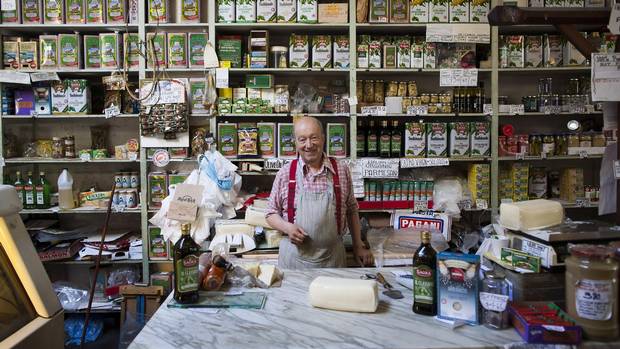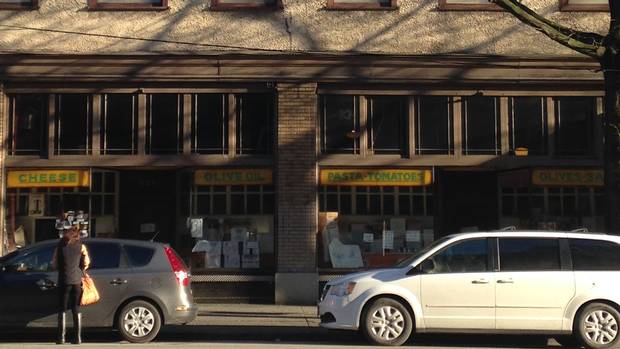Imagine if Chinatown no longer existed. Those shops stacked high with winter melon like mini Zeppelins, heaps of dried mussels and cucumbers, butcher shops with crinkly Chinese sausage dangling from green string and bright pink BBQ pork, ginseng, tea – all of it gone, replaced with chain stores and high-end supermarkets.
There's already a fancy new supermarket on Main Street where, under the watchful eye of a concierge at the door, you can buy $10 sandwiches at the espresso bar. At Gore and Pender is the giant mural depicting Tao scholar Lao Tzu. Now, a residential building under construction completely obstructs it.
Gentrification isn't just nibbling at Chinatown's edges. Thanks to rezoning changes, it's taking major bites out of the neighbourhood. There are two major mixed-use condo rezonings at Main Street and Keefer that are massive, bulky and featureless, like something you'd see on Robson Street. Instead of Chinatown's packed sidewalks that force you to dodge elderly people with their wheeled shopping bags – part of the experience – this stretch of bright wide sidewalk speaks of new money.
Class inversion is happening in cities throughout North America. Urban cores used to be the domain of low-income groups, while the wealthier demographic lived in the suburbs. In recent years, wealthier groups are choosing urban living and pushing low-income groups to the outskirts, or further.
"You have to ask, 'Where is this coming from? Who are you serving?'" asks Kevin Huang, executive director of the Hua Foundation, a non-profit for young Chinese-Canadians. Mr. Huang is also committed to supporting the people who form the tight-knit Chinatown community, and who are now under threat of displacement.
He gave me a tour of Chinatown this week, pointing out the many empty storefronts that used to be run by old Chinese family businesses. Some moved out when the new owners increased the rents. Others were evicted, the properties held as investments. The impact is significant, as Mr. Huang's own survey shows. He's counted the loss of 50 per cent of the area's green grocers in the last six years, 33 per cent of herbal stores, 60 per cent of fishmongers and 38 per cent of BBQ meats and butcher shops closed in that time period. With so much uncertainty, the association that owns the May Wah Hotel on East Pender – which is 120 units of single-room housing – has decided to put the heritage building on the market for $10-million.
"With this rezoning, I think this is a battle for the soul of Chinatown, and what does it mean for us as a city in terms of diversity and inclusion," Mr. Huang says.

Vancouver housing activist Kevin Huang stands in front of a barbecue shop in Chinatown.
Kerry Gold/The Globe and Mail
People worry that the city's changes that allow building heights of 120 and 150 feet on Main Street have already made the historic neighbourhood bulldozer bait. They say a new proposal to allow 200-foot store frontages in exchange for 20-per-cent social housing would incentivize so much development it would be the end for Chinatown as we know it. Those new storefronts would be half a block wide, or roughly eight lot sizes. It's feared that land assemblies would become rampant, as in other areas of the city. There's evidence of an assembly under way on Gore Street, Mr. Huang says.
"We seem to be treating Chinatown as a development site instead of a community," civic historian John Atkin says.
The old mom-and-pop shops are already hurting, faced with mounting property taxes and aging ownership. The educated next generation doesn't always want to take over the old business. And those new corporate retailers wouldn't be able to buy from within the neighbourhood or from small local farms the way current businesses have for a century. The old local economy of Chinatown – a model of sustainability before it became a buzzword – would be destroyed.
Chinatown is one of the city's lowest income neighbourhoods. It is also a strong community. Like other North American Chinatowns, it formed more than a century ago in the face of racism and segregation. The community banded together with associations that offered cheap single-room housing and other community supports. Residents fought a 1960s plan to mow Chinatown down with a freeway, and if Mr. Huang and a mobilized group of a second and third generation Chinese activists get their way, it will survive this new threat of destruction by gentrification.
Melody Ma, a self-professed "policy wonk," grew up attending dance classes in Chinatown. Both Ms. Ma and Mr. Huang see the city's failure to prioritize people, with their histories and traditions and lives, as the problem. Other cities have adopted culture as an integral part of their urban planning, including New Westminster and Montreal, so they've asked Vancouver City to consider doing the same. Councillor Elizabeth Ball put forward the motion Wednesday and city council agreed to consider adopting recommendations that would make culture as much a priority as green buildings.
If the city had already adopted such a policy, it's doubtful the two massive buildings on Main Street that dwarf Chinatown would look the way they do now, Ms. Ma says.
"That means developers will have to make sure they consider the needs of the community prior to even talking to city hall – that we're recognizing the culture and history and the aspirations of the people who live there," she says.
It's more than the buildings. Unless the culture is preserved, the place becomes commodified and soulless, she says. To thwart displacement, the city offers up bigger building potential in exchange for a few units of social housing. But what good is social housing if a community is wiped out?
As she sees the changes, Ms. Ma wonders where she'll fit in.
"I grew up in Vancouver, and I'm starting to wonder whether this is the right place for me to be in anymore. Not because of affordability issues, but because I'm seeing that the city losing its soul, and it loses its soul when the culture is disappearing.
"My childhood is a construction pit right now. And all around town this is happening. If we continue on this path, then what you are going to get is the Hooters and Walmarts and Rexalls that can afford these places, and we lose all the character that makes us want to live here."
All indications are that Chinatown would be well on its way to revitalizing if the threat of big development wasn't in the air. Tons of new coffee shops, restaurants, barbershops and boutiques have opened in the last few years. Restaurants have nearly doubled. In 2011, there were 405 business licensees; in 2016, licensees grew to 429, according to city data. Chinatown is proving to be a draw for young small business operators.
Chef Ryan Mah is owner of Pacific Poke, which occupies a small space in one of the new developments.
Mr. Mah's grandfather Tim Louie was the first son of famous B.C. grocery store businessman H.Y. Louie. Both his grandparents, Tim and Pearl, ran small businesses in Chinatown. When he went looking to start his own restaurant, he knew he wanted to return to the neighbourhood.
Other Chinese-Canadian entrepreneurs of millennial age share the same desire to bring the old hood back to life.

Angelo Tosi, 84, owner of Tosi & Company, the last Italian shop in Chinatown, is photographed at the shop in Vancouver, British Columbia, Thursday, August 11, 2016. His father opened the shop in 1906 and recently Angelo has put the place up for sale because he can’t afford the city’s taxes anymore.
Rafal Gerszak/The Globe and Mail
Mr. Mah takes a break from his work behind the counter to talk about the city's proposed changes.
"It really hurts the small businesses and community, and it takes a lot of opportunity away for the Chinese residents here in general."
Small businesses such as Mr. Mah's face deeper challenges if the city doesn't craft policies to protect them. In the 200-block of E. Georgia and Keefer streets alone, assessments climbed 20 per cent, or $615,000 on average, per parcel, in 2016. A new building at 245 E. Georgia, which used to be the Keefer Bakery, went up 67 per cent. Ms. Ma knows of a former grocery that now stands empty after being flipped at least once. She thinks the city should consider an empty-store tax the way they've done with homes. Empty storefronts are blight on a community. She'd like to start a shaved ice or bubble tea store of her own, but leases are high, and many of the landlords want only temporary pop-up businesses instead of long-term tenants. Others don't maintain the buildings, Ms. Ma says.
Ms. Ball says the city has to be careful not to build a city of soulless developments.
"Money has its own life and you have to realize money as a great big thing sitting there has to be balanced …We want culture in our city. We have a chance to stop and take a breath, and say, 'You've created a beautiful resort, but what have you put in that allows people in their small apartments to find a way to communicate with the people around them?' Very little."
The city's acting assistant director of planning for downtown, Karen Hoese, says she's been listening to the criticisms. They are looking at ditching the rezoning policy that allows buildings higher than 90 feet. But if they allowed a bigger project, with a wider frontage, it could allow for better design and the city could get community benefits out of the developer. But she's hearing that the community isn't impressed with the benefits, or the threat to their neighbourhood. So they will be seeking more feedback in February, after Chinese New Year.
"It's this trade off between Chinatown character and getting the public benefits you would get through allowing larger developments," Ms. Hoese says. "And one thing I'm hearing is [a concern for] Chinatown character … And we have been hearing concern about the big developments. We need to hear about those concerns.
"Unfortunately, there have been negative responses to certain things happening in Chinatown, but it has pulled people together, and I think it's great young people in Chinatown are getting involved in determining the future of that community."
But pressure on the community will only intensify because the area is in the crosshairs of future densification. A couple of blocks away, the viaducts will come down and the new St. Paul's Hospital will transform the historic area into a hub of high-tech medical care.
Ms. Ma says "it was a mountain to climb" just getting council to agree to consider culture as a priority.
"We have to ask ourselves, 'How do we place a culture or community first – rather than just follow finance?'"
